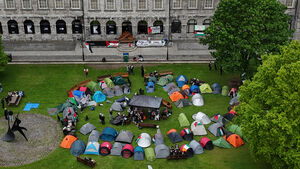Christy Loftus: Living in a tent is no longer a matter of choice

Students taking part in an encampment protest over the Gaza conflict on the grounds of Trinity College in Dublin. The encampment was dismantled late last week after college management agreed to sever ties with some Israeli institutions.
In the not too distant past, tents were an item of potential pleasure and glee as users looked forward to a cheap and different way to spend a holiday. It has to be said that such holidays were not always the panacea that the tent advocates hoped for. Weather, wind and rain had a way of turning a fairytale into a nightmare. The nostalgic users would make the most of their experience while others concluded never again. This country was never a place where tented holidays were ever likely to become popular.
In times past, I’ve had experience of sleeping (well trying to sleep) in tents and I found them most uncomfortable and not very conducive to rest or sleep. It is also the case that where you might have a partner in your tent he/she might be loquacious when you wish to slumber down or may erupt into snoring to keep you awake.
But these are observations that have little or nothing to do with the tent that increasingly nowadays has to do with a place of refuge, a little haven of hoped-for safety in a changed world where conflict, struggle and man’s inhumanity to man takes precedence over justice, fair play, integrity and decency.
All around the world, we see tented cities facilitating displaced people, single people, families, young people who have grown up to be men and women who have known nothing but life in a tent. We are not talking here about nomadic peoples who enjoy moving around and making a full and good life, living out of their traditional tents in a lifestyle they enjoy. We are talking about those who have no choice.
The reality is that a tent is not the answer. The people of Gaza or a considerable number of them are now forced to exist in tented accommodation. These are people who have been chased out of their homes, forced out by the Israeli Defence Forces (IDF), some on many occasions from different locations and are again being forced out of Rafah - the city they were forced into - to facilitate the destruction of their homeland.
Regarding the IDF, it’s a mystery to me how reasonable people, including some Israelis, fail to see that the IDF is not a defence force. They are an extremely aggressive, dangerous and reprehensible attack force with no limit placed on their ambition to destroy the Palestinian population. Indeed, they are encouraged in that ambition by their government. It is sad that world governments and an acquiescent media accept that the IDF’s role in Gaza is defensive. That acceptance gives the IDF carte blanche to do as they do.
There is another whitewash that governments and media acquiesce in and it’s that these are “displaced” people. These are people who were forced out of their homes under threat of attack by the tanks and bombs of the so-called defence forces of the state of Israel. “Displaced” puts a bit of a balm on the reality that these people are dispossessed refugees. Irish history has plenty examples of the pain and cruelty that goes with dispossession.
Those are sweeping statements and such statements are open to contradiction, as I discovered recently when I wrote that the people of Israel supported the war in Gaza. I was taken to task by a member (non-practicing) of the Jewish faith living in north Mayo who quite correctly pointed out that there were Israelis who did not agree with the policies pursued by the Netanyahu government. Israeli polling (and no, I’m not a fan of polls) show that only 80% of the Israeli people support the war in Gaza. It is a substantial majority and a comfort to Netanyahu.
Netanyahu eschews a possible pause in the Gaza war that might allow for the return of remaining hostages held in captivity by Hamas and continues to pursue his war in Rafah, and that will result in a minimum of 500,000 people moving from conflict into yet another tented city somewhere, anywhere, but just get out of Rafah. This is the IDF policy of ensuring the safety of the Gazan civilian population. The “success” of that policy can be seen in the 36,000 plus dead women and children.
And so we bring the tent home to this wonderful little country. Tents have become part and parcel of the protest movement against migrants. No self-respecting Irish protestor can turn up without a tent in tow. They pitch their tent wherever they wish. They are the sole arbiters of right - their right to do as they please without regard to the law or the rights of others.
But we have seen the tent used to good effect too. In general, I would not be an admirer of student protests, my cynical view being that they would be better off attending their lectures instead of taking to the streets and disrupting life for ordinary decent citizens. The tents in Fellows Square in the grounds of Trinity College and the sit-down protests may have discommoded tourists wishing to view the Book of Kells but the cause the students pursued was just and worthwhile.
They espoused the cause of the Palestinian people, but even more, they shone a light on the disreputable engagement Trinity management had with Israel and some Israeli universities complicit in the war in Gaza. I am aghast (I like that word and think it appropriate!) that a Trinity management from which I would expect impeccable policy controls could be duped into collaborations with an Israeli institution that is less than savoury.
After five days, Trinity management saw the error of their ways and acceded to the wishes of the students. It was a policy climbdown by management but one has to wonder about the governance of the Trinity governors that they should have got involved in what was, at best, an unseemly arrangement in the first place. Good governance does not appear to be high on the list of many Irish institutions, University of Limerick being another academic institution with questionable governance practices.
And so to Mount Street and the Grand Canal. Because we can’t provide appropriate accommodation to our migrants seeking asylum here we give them tents. I don’t know whether the asylum seekers are given any guidance as to what they are to do with the tents but it is not unreasonable to expect that they will pitch their tents close to the services they seek to access. And so we have had the tasteless sight of officials with mechanical grabs destroying and removing the tents which only days earlier had been given to the refugees to ease their trauma.
Now, one might argue that the refugees could have dispersed to locations where their existence would be hidden from the view of the public - the old out-of-sight, out-of-mind solution so frequently used as an Irish solution to an Irish problem. But these refugees are only recently arrived and can’t be expected to understand that while we give them tents we don’t give them the right to pitch them anywhere.
I can accept the argument that a good number of these migrants are economic migrants rather than genuine refugees and some also have a selfish view of their entitlements and seemingly put themselves ahead of the many Irish homeless people who seek proper accommodation and who have a greater entitlement because of their citizenship. It is obvious that tents are not the answer, though I would not mind having the contract to supply tents which our officials so generously hand out.
Níl aon tinteán mar do thinteán fhéin.





